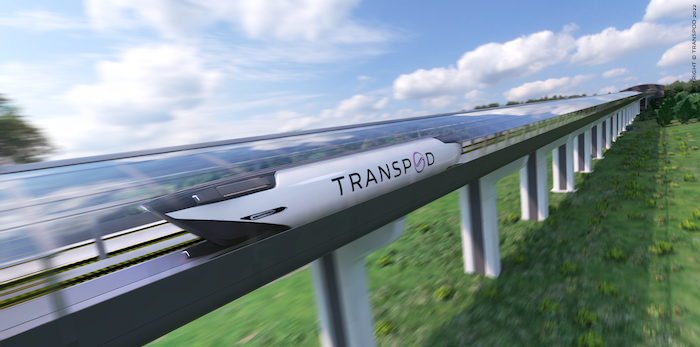
News
Hatch signs on to help design and build Calgary-Edmonton hyperloop
July 18, 2022
By CCE

Canadian consulting engineering firm Hatch has signed an agreement to support the next phase of TransPod’s hyperloop test track and subsequent full-line project between downtown Calgary and downtown Edmonton.
TransPod, a Toronto-based start-up, is developing an electrically powered tube system to carry vehicles at speeds faster than 1,000 kph, which would enable passengers to travel between the two cities in less than one hour. Hatch has agreed to support the transportation project’s design and construction.
Since 2013, when Elon Musk published the Hyperloop Alpha white paper, multiple companies have answered his challenge to develop a solar-powered system whereby air compressors and linear induction motors would propel and accelerate passenger pods through an elevated steel tube. TransPod’s concept, however, uses real-time control and sense-space systems and moving electromagnetic (EM) fields to provide stable levitation without compressed air.
Specifically, the company has patented a plasma-based, high-speed, contactless power transmission system from the rails to the vehicle, dubbed ‘Quantum Power;’ and an active levitation system that uses magnetic motors to generate thrust and braking and to keep the vehicle centred along the guideway, dubbed ‘Jet Glide.’ TransPod is collaborating with regulators to determine if its system would fall under railway or aerospace rules.
The company signed a memorandum of understanding (MoU) with Alberta’s government in 2020 to support the development of a line between Calgary and Edmonton, then conducted a pre-feasibility study in 2021 and announced further plans in 2022, with Stage 1 involving a five- to 10-km test track within Edmonton, from downtown to the airport.
Hatch’s engineers will participate in the design and construction of the test track, for which an environmental impact assessment study has begun. Work on selected third-stage front-end-loading (FEL3) engineering scope and cost estimates will follow shortly.
Construction, high-speed tests and certification of the test track are expected to start in 2023 and finish in 2027, to be immediately followed by the inter-city line’s construction.
Print this page
